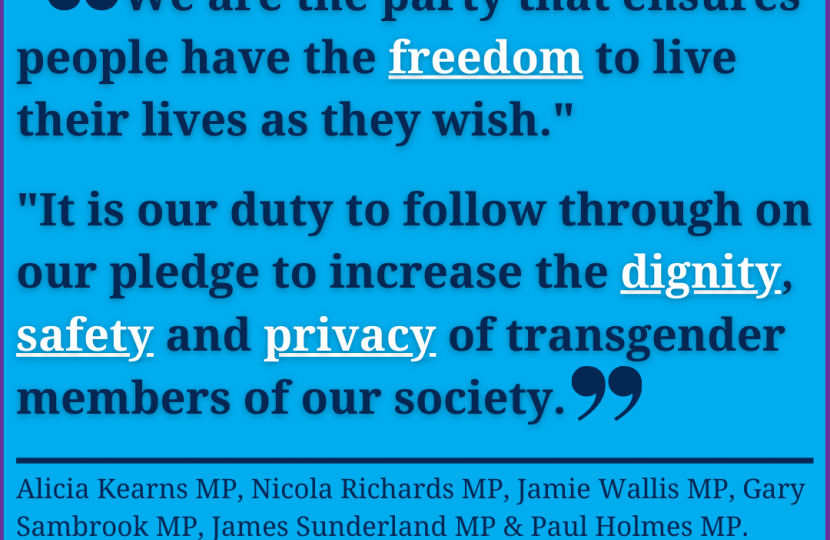
The Conservative Party is the party that seeks to protect individual choice. We are the party that ensures people have the freedom to live their lives as they wish. So it was absolutely right in 2017 for the then government to announce plans to improve the legal recognition for trans people in England and Wales. Following a lengthy consultation, now is the time for the Government to follow through on their promises to the trans community.
We are world-leading in LGBT+ rights, but we can do better. It is good that we acknowledged this, and have plans to rectify the stumbling blocks for a community that faces many challenges with current processes. There are many misconceptions about what it is the UK Government promised three years ago, so let us explain.
The Gender Recognition Act (GRA) allows for transgender people to change the gender on their birth certificate through a Gender Recognition Certificate (GRC). The current process for doing so has been acknowledged by many as being overly bureaucratic, medicalised, and lacking transparency, making it inaccessible to many trans people.
Recent data indicated that fewer than 5000 people had obtained a GRC, which represents approximately one per cent of the estimated trans population in the UK. That’s why, in 2018, the Government launched a consultation to seek input on how to improve the process.
Having a Gender Recognition Certificate is important for transgender people as it ensures they are not ‘outed’ and humiliated while doing the things the rest of the population take for granted. For example, getting a marriage or civil partnership in the right gender, have their gender recorded correctly when they die, and have their pension and insurance policies administered in their chosen gender.
It also helps to protect their privacy by ensuring their birth certificate is consistent with their other records (such as medical records, bank accounts, passports and driving licences). Some jobs, such as those requiring security clearance, may require a person’s birth certificate as part of routine checks.
Having this certificate does not add any “extra” equality rights, impact the inclusion of trans people in single-sex spaces, or the provision of services. Trans people can already use, and have always been able to use, services matching their gender, regardless of whether they have the certificate. Services such as Domestic Violence Refuges have always been able to exclude a trans person in certain circumstances, if it is proportionate and regardless of whether they have a GRC. This is covered by the Equalities Act.
It can only be beneficial to streamline and simplify dealings with the state, and have less state interference in one’s life. Concerns about this process seem to be based largely around unevidenced fears that the safety or rights of non-trans people, particularly women, might be at risk. There is no evidence that improving the process of legal gender recognition for transgender people impacts on non-trans people. In 2015, Ireland passed an updated GRA which allowed for self-identification – there has been no negative consequences to this decision. There is, however, evidence that improving legal gender recognition for trans people increases their quality of life, dignity and safety.
We must also go further than our promises to streamline the legal progresses, with a focus on our health response. Waiting times for gender identity clinics throughout the UK are incredibly long and well beyond the 18-week waiting time guaranteed by the NHS Constitution. With the impact of Covi-19, they continue to rise with the average wait for a first appointment being between two and four years. Shocking statistics from the 2012 Trans Mental Health Study showed that 50 per cent of trans people surveyed said they had attempted suicide once, with 84 per cent saying they had considered it. It is clear provisions need to be better and available quicker.
As Conservatives, we have made it a central tenet that individuals should be free to live their lives as they choose. It is our duty to follow through on our pledge to increase the dignity, safety and privacy of transgender members of our society.
No one should experience inequality simply for being who they are. We have friends and family that are trans, so it is particularly concerning that they are at heightened risk of experiencing domestic violence, homelessness, hate crime, discrimination, and assault. The process of transitioning is mentally, physically, financially, and emotionally challenging, even before considering the bureaucracy involved.
We must do more to ensure that our trans community can be properly supported by our fantastic NHS and not face these challenging processes alone. We are proud of our inclusive Government and the steps we have already taken. Now is the time for following through on our promises.
This article is also co-authored by the following MPs: Nicola Richards, Jamie Wallis MP (Bridgend), Gary Sambrook (Birmingham Northfield), James Sunderland (Bracknell), Paul Holmes (Eastleigh), Richard Holden (North-West Durham), Elliot Cockburn (Carshalton and Wallingford) and Ben Everitt (Milton Keynes North).


